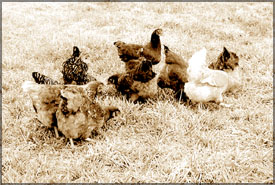GM chicken, new weapon in fight against cancer
 British
scientists have developed genetically modified hens capable of laying
eggs containing proteins needed to make cancer-fighting drugs. British
scientists have developed genetically modified hens capable of laying
eggs containing proteins needed to make cancer-fighting drugs.
The breakthrough was the work of the Edinburgh-based Roslin
Institute, the same research centre that created the cloned sheep Dolly, the BBC reported.
the cloned sheep Dolly, the BBC reported.
The work could lead to a range of drugs that are cheaper and easier
to make, said the report. Professor Harry Griffin, director of the
institute, told the BBC: "One of the characteristics of lots of medical
treatments these days is that they're very expensive.
The idea of producing the proteins involved in treatments of flocks
of laying hens means they can produce in bulk, they can produce cheaply
and indeed, the raw material for this production system is quite
literally chicken feed." Roslin has bred five generations of the
modified birds.
Numbering 500 in all, their existence is the result of more than 15
years of work by Dr. Helan Sang, the lead researcher. But it could be
another 10 years before a medicine is fully developed, the institute
cautioned.
Therapeutic (curative) proteins such as insulin have long been
produced by bacteria, but there are some complex proteins that can be
made only in the more sophisticated cells of larger organisms, said the
BBC report.
Already, scientists have successfully produced a range of these
molecules in the milk of genetically modified sheep, goats, cows and
rabbits.
Now chickens have been added to the list of "biofactories". It is a
fairly straightforward process to extract and purify the therapeutic
proteins located in the egg whites, said the report.
Some of the birds lay eggs that contain MiR 24, a type of antibody
with potential for treating malignant (harmful) melanoma, or skin
cancer. Others produce human interferon b-1a, which can be used to stop
viruses replicating in cells.
The Straits Times
|
